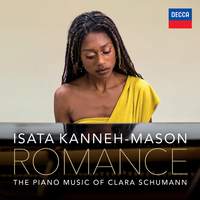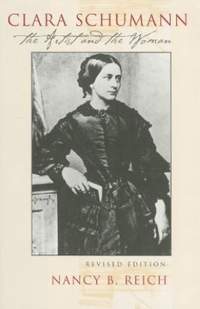Interview,
Isata Kanneh-Mason on Clara Schumann
 For her debut album on Decca, the 24-year-old pianist Isata Kanneh-Mason celebrates the bicentenary of one of her musical heroines, the virtuoso pianist and composer Clara Schumann (née Wieck), who gave the premiere of her own Piano Concerto with the Leipzig Gewandhausorchester and Felix Mendelssohn at the tender age of sixteen and went on to compose a small but important body of solo piano works, songs and chamber music whilst sustaining a busy recital career and championing the music of her husband Robert.
For her debut album on Decca, the 24-year-old pianist Isata Kanneh-Mason celebrates the bicentenary of one of her musical heroines, the virtuoso pianist and composer Clara Schumann (née Wieck), who gave the premiere of her own Piano Concerto with the Leipzig Gewandhausorchester and Felix Mendelssohn at the tender age of sixteen and went on to compose a small but important body of solo piano works, songs and chamber music whilst sustaining a busy recital career and championing the music of her husband Robert.
I spoke to Isata ahead of the album’s release about Clara’s precocious talents as a composer and performer, how her style evolved over the course of two decades, and the impact which she had on subsequent generations of pianists.
When did you first get to know Clara Schumann’s music?
It was only around a year ago: the first thing I heard was her Scherzo No. 2 Op. 14, and I remember loving it straight away but being really surprised to learn that it was by Clara Schumann. My first thought was ‘Wow, this is really good – how come I don’t know more of her music?’. So I went exploring, and found so much more that I really enjoyed.
The Piano Concerto is a very early work indeed – how obvious is it that this is music composed by a teenager, and who were her main musical influences at that stage in her life?
I was already half-way learning the piece when I found out that she’d composed it at such a young age, and I definitely didn’t expect it – in fact I was pretty surprised and amazed. That was partly because it's so virtuosic in places: she started composing it at thirteen, and completed and performed it at sixteen with Mendelssohn conducting, and the fact that she could play a work like this at that age (let alone compose it!) is pretty remarkable. A lot of it reminds me of the Chopin piano concertos, and I think she definitely was influenced by him at that age - but having said that, her voice is also already very unique. Robert Schumann also had quite a lot of input: they were already quite close at that point, and she asked him to help her orchestrate the third movement.
Many of this year's anniversary tributes to Clara have set her music alongside works by Robert and by Brahms: was that something you definitely wanted to avoid?
I have represented Robert in a way by including two of Clara’s transcriptions of his songs, but I was quite keen for this to be an album of Clara Schumann: not many people do that, and I felt that featuring other composers would defeat the point a bit!
The works on the album span several decades: how much do you think her style changed over the course of her composing career?
I think the later works are definitely more complex than the early ones – you can certainly hear her developing as a composer, but what I found really interesting is that even the early works have this sense of grief to them. She didn’t really have a very happy childhood, so I think all her works have an underlying sense of sadness: that’s there from the start, but her style definitely matures.
Given that so much of her music was written for performance in her own recitals, what does Clara’s writing for the piano tell us about her own strengths as a pianist?
I think we can definitely see that she had very big hands: the concerto involves a lot of leaping around, so she was obviously a very accomplished pianist too, even at a young age. I also think she must have been a very interesting personality, because although most of her pieces are quite short she packs so much into them – she clearly had a lot to say!
How much influence do you think she had on subsequent generations - not just in terms of her career and composition, but in her approach to recitals?
For starters, she was one of the first pianists to perform from memory, and that had a huge impact on later generations in that most pianists nowadays perform without music. And of course whilst there were some female performers around in her lifetime, there weren’t too many of them, and certainly not many who had as successful and fulfilling a career as she did. I think she definitely paved the way for subsequent generations of female performers, and female composers as well.
The Three Romances (written at a particularly dark time in her life) are a rare example of her composing for an instrument other than the piano…how idiomatic is her writing for the violin?
Full disclosure: the violin isn't really my territory! I get the impression that they’re not super-comfortable to play, but when they’re played well they really do complement the instrument and speak very naturally: she wrote them for Joseph Joachim, who was obviously an incredible violinist, and we certainly had a really good violinist for this recording!
Do you have any theories on why she didn’t really return to composing after Robert’s death?
I’m tempted to say that it could be partly because Robert encouraged her composing quite a lot: she often expressed doubts about her composing skills and thought ‘Should I actually be doing this?’, whereas she was much more confident and comfortable in her ability as a performer. So perhaps when Robert died she felt less of a need to compose, but that's pure guess-work on my part!
Have you read anything that’s given you particular insights into Clara’s life and work?
There’s a great biography called Clara Schumann: The Artist and the Woman by Nancy B. Reich, who goes into lots of fascinating detail about her life – in fact I learned most of what I know about Clara from this book. It’s not at all dry or academic: it’s written more like a story, and I’d really recommend it to anyone who wants to know more about her.
Isata Kanneh-Mason (piano)
Available Formats: CD, MP3, FLAC, Hi-Res FLAC




